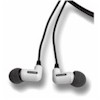How to Buy Earphones
The saying "a stereo system is only as good as its speakers" applies to portable audio as well. Why spend hundreds of dollars on the latest smartphone and use $10 earphones? Whether you are looking for ipod earphones, bluetooth earphones for your cellphone, or earphones for an inexpensive radio, the quality and type matters. The best earphone choice depends upon your use.
 |
 |
 |
 |
Shown above (left to right), Shure in-ear noise-cancelling earphones, Bang and Olufsen ear buds, Sony earpads, and Sony wireless(IR) earmuff headphones. |
|||
Earphone Types
- In-Ear - Use a soft material to fit snug into your ear canal.
- Ear Buds - Use hard plastic pieces to rest inside your ear.
- Ear Pads - Large pads press up against the outside of your ears. They let some sound out as well as allow outside sound in.
- Ear Muffs - Cup over your ears to create a seal that insulates your ears from outside noise.
Attributes
- Sound Quality - not only does it vary across headphones, it is also somewhat subjective. The best way to assess this is to listen to the headphones before buying (or purchase a few pair and return the lower quality ones).
- Comfort - another subjective parameter of headphone. For example in-ear headphones will often feel awkward to new users or ear muffs may feel hot or uncomfortable to some people.
- Wireless - most use radio frequencies to transmit your music without a cable. Most are prone to interference from portable phones, blenders, garbage disposals, etc. Some use infrared (which requires a clear line of sight to the transmitter). In addition, some wireless models have been reported to flatten out the range of sounds.
- Noise-Canceling - Some headphones have built in systems that cancel out the sound waves coming from outside the headphones. This feature is particularly beneficial on car or airplane trips.
- Surround Sound - some headphones can even simulate Dolby surround sound for the full effect of watching movies.
How To Choose Earphones
- Listen to the headphones in the store with your own music. Pay attention to the full range of frequencies.
- Don't assume that expensive headphone are better than moderately priced ones.
- Before you purchase wireless headphones, be sure you can return them. You may take them home and encounter interference that didn’t happen in the store.
